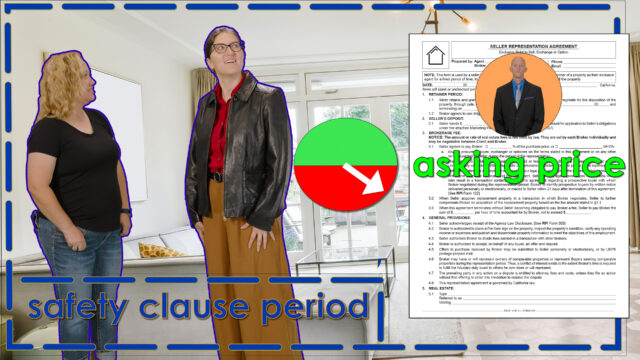Click any image below to view the video.
Latest video published 9/3/2019
- Staging Sets a Buyer’s Expectations

See how a buyer’s enforceable expectations about property conditions are set at the time a purchase agreement is entered into, and how buyer agents gravitate towards properties offered with investigative third-party reports and seller disclosures in a complete marketing package.
- The Seller’s Costs to Properly Market their Property for Sale

See how third-party investigative reports transform the marketability of your seller’s property by taking the “what ifs” out of real estate.
- Placing Signs Off-Site

Placing real estate signs on private or public property without permission is a misdemeanor public nuisance in California, making the broker liable for local government enforcement and penalties under the Penal Code. Knowledge of the rules is your reputation – and money – saved.
- Reasonable Restrictions on the Placement of “For Sale” Signs

While California law and the First Amendment generally protect a property owner's right to display "For Sale" signs, these rights are subject to reasonable government and HOA regulations regarding safety, dimensions and placement in common areas.
- Real Estate Sign Placement – It Matters

The first episode of our new series dramatizes how to properly display a “For Sale” sign on a property on behalf of the seller to advertise the property for sale, and understand when permission is needed to advertise a property with a “For Sale” sign in a common interest development (CID).
- Resolving a Seller’s Dual Liability when Changing Brokers

The final episode of our new series dramatizes the representation dilemma created for the seller when the retainer period under a new representation agreement overlaps a safety clause period in an expired representation agreement with a prior broker.
- Due-on clause exceptions and waivers

This article covers exceptions and waivers to the enforceability of the due-on clause present in all trust deeds and enforced on sales only during a cycle of rising long-term fixed rate mortgage rates.
- A closer look at the due-on clause

This article covers an owner’s use of property rights which allows a mortgage holder to capitalize on the due-on clause to extract further profit by calling the mortgage due and payable, or waiving the call to modify the interest rate and payment schedule at current market rates.
- Price Paid is Different from the Seller’s Asking Price

The fourth episode of our new series answers the critical question of what happens when a registered buyer purchases property during the safety period for less than the asking price sought under the expired representation.
- (Re)introducing the due-on clause

This multimedia article explains when due-on clauses become used in the economic cycle and under which sale and leasing arrangements.


















